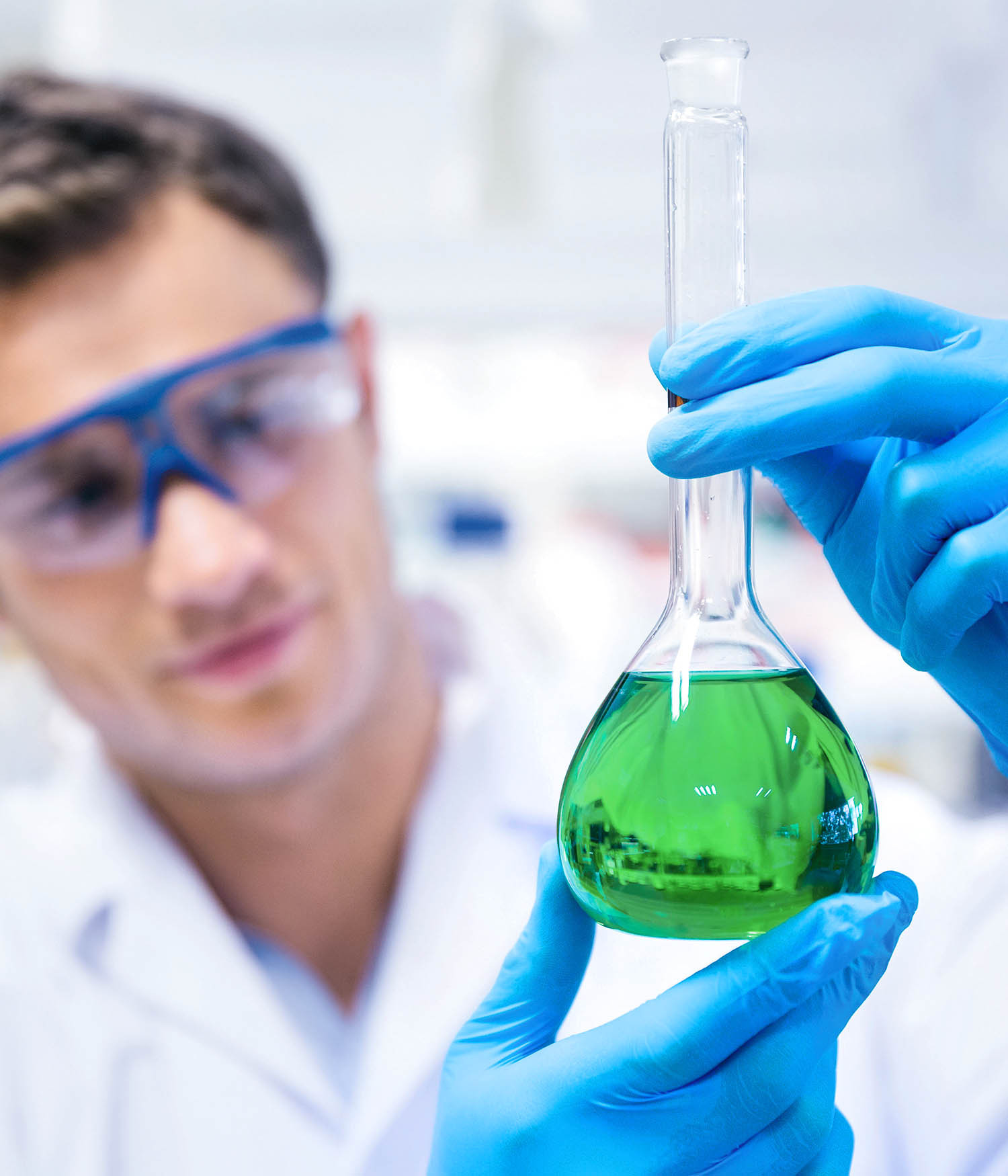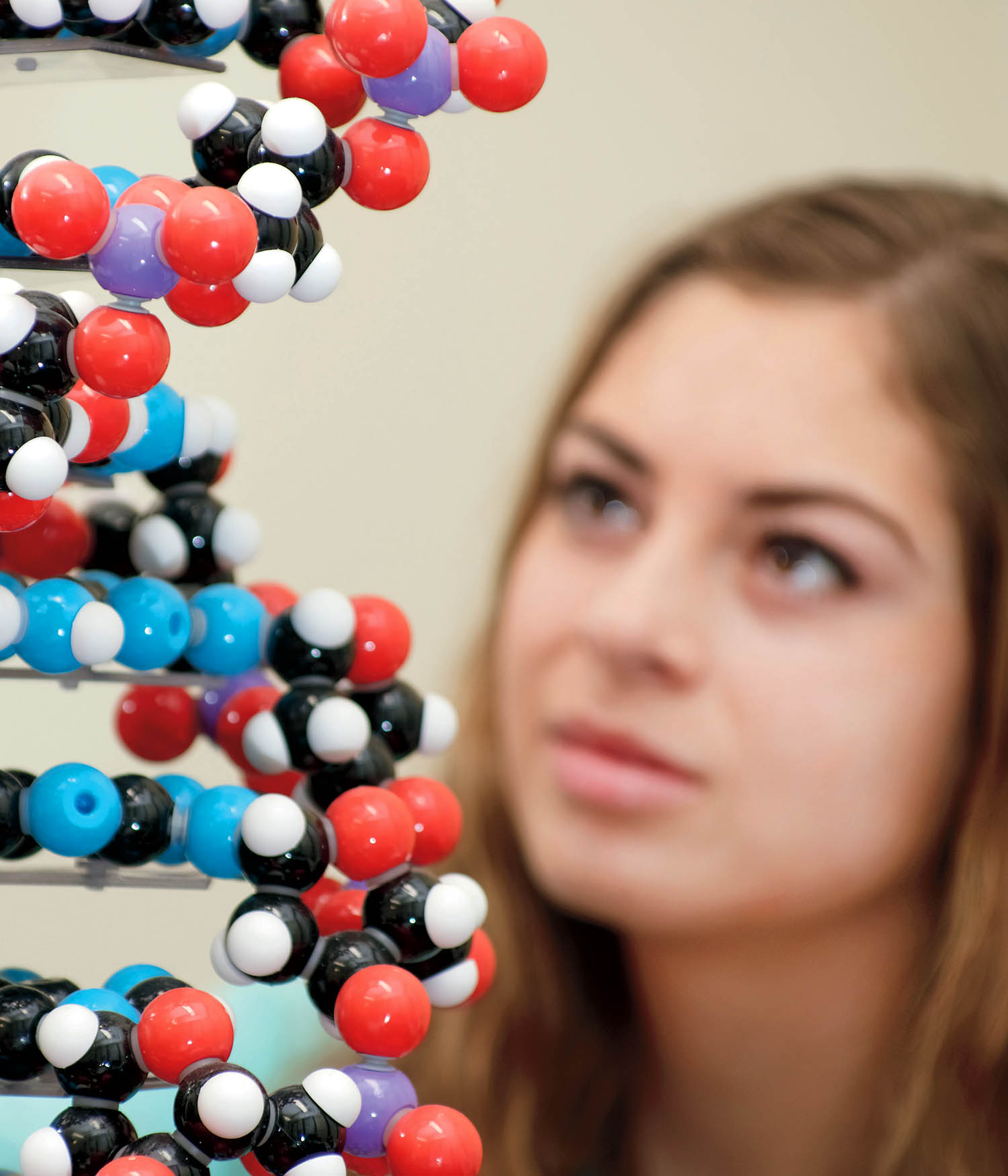Eight Majors, Unlimited Opportunities

Choose Your Path
Our eight majors make scientific research and discovery a very real practice — often as soon as you come to campus. We offer the chance to pursue interaction with faculty who can help direct your course of study, opening a world of career possibilities.
Several of our majors allow you to choose between Bachelor of Arts or Bachelor of Science degrees, to prepare for a career in the classroom or to add a master’s degree as part of an extended program.
Part of a Team
All majors encourage interactions with peers and professors where you can be part of a team that is solving problems with real-world impact. Students and faculty from different disciplines combine their interests and expertise to innovate together, finding answers where fields intersect.
The future is here. Expect to be a part of it in the College of Science.

Biochemistry
Biochemistry is the study of biochemical processes that take place in living organisms. Be on the leading edge of learning how these processes affect human disease, plant and animal genetics, and bacteria. This major provides undergraduate research opportunities in biochemistry and genetics of plants, animals (including humans) and eukaryotic pathogens.
Degree Options
- Bachelor of Science: Prepare for a scientific career in research and development, teaching, health care, public health or a wide variety of other disciplines.
Fast Facts
- More than 75 percent of our students go on to professional or graduate school programs.
- Clemson’s partnership with the nearby Greenville Health System is working to advance health care research.
- Programs interact closely with the Clemson Center for Human Genetics.
- Biochemistry is in the Department of Genetics and Biochemistry.
Biological Sciences
A major in biological sciences is as diverse as life itself. Learn about the evolution of animal behavior or choose to study the molecular underpinnings of human disease.
Degree Options
- Bachelor of Science: A more comprehensive science degree, preferred for those who wish to enter professional school or continue into graduate programs.
- Bachelor of Arts: This degree provides a strong foundation in biology, ideal for students planning a career in health care, law or policy. Specialize in prerehabilitation or secondary science teaching.
Did You Know?
- Biological sciences is the most popular major for students preparing for medical or dental school.
- Biological sciences is the most popular degree-granting program at Clemson.
- The flexibility of the curriculum encourages students to engage in research, study abroad, internships and other experiential learning activities.
- Biological sciences is in the Department of Biological Sciences.


Chemistry
Chemistry is intimately involved in all physical and life sciences, studying substances at the atomic and molecular level, and the ways in which they interact with each other. You’ll apply this knowledge to develop new or improved products.
Degree Options
- Bachelor of Arts: This degree broadens study through a minor in an area outside of chemistry. This is an excellent foundation for medicine, pharmacy, business and law.
- Bachelor of Science: This is ideal for students interested in research, graduate studies or biomedical careers. It prepares students for professional careers in chemistry.
Did You Know?
- About 70 percent of graduates pursue a professional or graduate degree after graduation.
- The Bachelor of Science program is certified by the American Chemical Society; all students participate in research.
- Labs include leading-edge tools and instruments, including nuclear magnetic resonance spectrometers.
- Chemistry is in the Department of Chemistry.
Data Science
Data science is a multidisciplinary program at the intersection of mathematics foundations, statistics and computer science. Program graduates will be able to design and execute analysis for real-world data problems.
Degree Options
- Bachelor of Science: Students select an “application area” from any academic discipline on campus, providing domain knowledge to accompany depth of knowledge in mathematical sciences, statistics and computer science. In addition, students will strengthen skills in public speaking, data storytelling, management and ethics.
Did You Know?
- The median salary for a data scientist with a bachelor's degree is $103,500.
- This program is one of only two data science bachelor’s degree programs in South Carolina. Clemson University is known for its exceptional student experience.
- Common fields for individuals with a data science degree are finance, health care, marketing, sports analytics, retail analysis and consulting.
- Employment of data scientists is projected to increase by 36% from 2023 to 2033, according to the Bureau of Labor Statistics.
- Data science is in the School of Mathematical and Statistical Sciences.


Genetics
The codified language that is your DNA informs everything from your appearance to your likelihood for disease. Study genes at the molecular level — their structure, function and behavior — to understand how traits are inherited and passed on through generations. This major provides undergraduate research opportunities in biochemistry and genetics of plants, animals (including humans) and eukaryotic pathogens.
Degree Options
- Bachelor of Science: Via a thorough foundation in the life sciences, this degree option prepares students for medical, veterinary, pharmacy or dental school. Students can also pursue graduate school to research genetics and related disciplines.
Did You Know?
- This is the only undergraduate genetics program in the state.
- Clemson partners with the nearby Greenville Health System to advance health care research.
- The Clemson Center for Human Genetics collaborates with the Greenwood Genetic Center to discover and develop early diagnostic tools and therapies for genetic disorders.
- Genetics is in the Department of Genetics and Biochemistry.
Mathematical Sciences
Mathematical scientists use numbers, logic and reason to uncover new insights about nature and real-world phenomena. Students gain a scholarly foundation to help contribute to the ever-changing science and technology landscape.
Degree Options
- Bachelor of Arts: Secondary education math majors typically opt for this degree program.
- Bachelor of Science: Specialize in actuarial science and financial mathematics, applied and computational mathematics, abstract mathematics, applied and mathematical statistics, and data and decision sciences.
Did You Know?
- The median wage for math majors was $116,440 in 2023.
- Jobs for math majors include actuaries, data scientists, financial analysts, statisticians and operations research analysts.
- The employment outlook for math majors is projected to grow much faster than average for all occupations.
- A combined bachelor’s/master’s degree is also offered.
- Mathematical Sciences is in the School of Mathematical and Statistical Sciences.


Microbiology
Organisms such as bacteria, viruses and fungi are everywhere. Learn how these microscopic organisms cause disease and are harnessed as energy and food sources. Our graduates go on to medical, dental and pharmacy school as well as to graduate school for their doctorates.
Degree Options
- Bachelor of Science: Students gain a broad introduction to microbiology. Concentrate in biomedicine to learn more about human health and disease. This major easily accommodates a minor.
Did You Know?
- This is the only undergraduate microbiology program in the state.
- Undergraduate research opportunities are available in host-pathogen interactions, microbiome, cancer immunology and more.
- Microbiology students have opportunities to participate in various signature experiential learning opportunities through independent research, Creative Inquiry, service learning and study abroad.
- Microbiology is in the Department of Biological Sciences.
Physics
Physics seeks answers to the fundamental questions about matter and energy — the “why” and “how” of everything in the physical world from atoms to stars. Physics prepares students to tackle the open questions that lead to a deeper understanding of our universe and underlie all innovations in engineering, technology and medicine.
Degree Options
- Bachelor of Arts: This option supplements a foundational physics education with a required minor in the field of your choice. A dual degree through a partnership with the College of Education is also available.
- Bachelor of Science: This provides a strong preparation for a research career in academia, industry or national laboratories. A student can specialize in areas such as astrophysics or biophysics or work with an advisor to build a custom degree.
Did You Know?
- Our graduates go on to graduate school in physics, astrophysics, medical physics or engineering, or go straight into research jobs in industry.
- Our graduates work at NASA, Oak Ridge National Laboratory, the Center for Astrophysics and for many other high-profile industry leaders.
- All our students participate in at least one semester of research in astrophysics, atomic physics, atmospheric and space physics, biophysics or condensed matter physics.
- Physics is in the Department of Physics and Astronomy.


Non-Degree Programs
The College of Science offers two non-degree programs for students interested in pursuing careers in health care.
Preprofessional Health Studies Undeclared Major
- Preprofessional health studies is a major, but it is not a degree-granting program.
- Students explore science majors while completing general education courses alongside prerequisites for their desired health careers.
- Structured advising program allows students to compare academic disciplines before making a decision about the degree program to pursue.
- Ninety-hour curriculum closely follows the prerequisites needed for students planning to apply for the Accelerated Pathways to MUSC Professional Health Degrees while shadowing a degree granting major.
Preprofessional Studies: Prepharmacy, Non-degree
- Prepare for a career in pharmacy in the Preprofessional Studies: Pharmacy program.
- Ninety credits of general education requirements and typical prerequisites for PharmD programs prepares students to apply to a school of pharmacy, typically at the conclusion of their second year at Clemson.
- Students who complete the 90-credit program at Clemson and a full year of coursework at an accredited school of pharmacy are eligible to apply for the Bachelor of Science in Preprofessional Studies.
